#maybe one day ill become a professional author and actually write a whole book but until then.
Text
writing a story out of order is all fun and games until you change part of the story of the earlier scenes and now have to change the later ones
#ive already deleted 2#like not deleted theyre still there but i grayed them out?#like all the text is black but the stuff that doesnt fit canon has been made gray so it shows less#maybe ill make a separate doc for deleted scenes#ive been doing that for the past what. 3 years??? saving deleted scenes#not even to maybe use parts of it just to preserve things ive written#because i have been in situations where i remembered a fic id written only to realize id deleted it#yeah#sorry to the tsesg enjoyers i have a new hyperfixation and it is putting my baby boy ziero in Situations#read: give him trauma on top of the canon trauma#hes my character in ffxiv i have just grown very attached to him because he is Pretty#but obviously i only just completed heavensward so a lot of the stuff i write is incredibly disjointed#its fun though. and thats all that matters#maybe one day ill become a professional author and actually write a whole book but until then.#putting my faves into Situations is way more fun
3 notes
·
View notes
Text
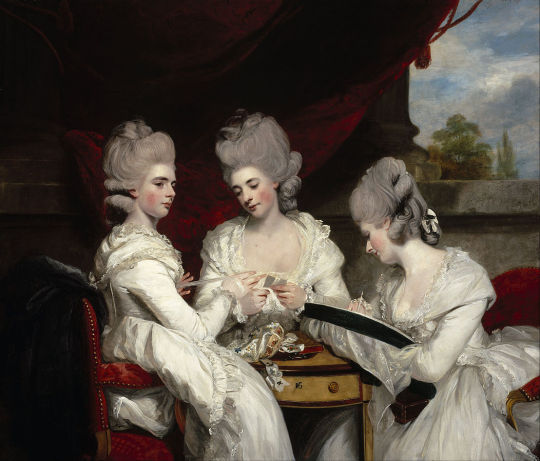
“The Ladies Waldegrave” by Joshua Reynolds, 1780 (NGS NG2171)
I’ve complained before about two very big pet peeves of mine - corset stuff and Regency women being dressed in 1770s-1780s clothes - but one that may dwarf them because of how frequently it comes up in historical and fantasy fiction is the oppression of embroidery.
That’s probably putting it a bit too strongly. It’s more like ... the annoyance of embroidery. Every character worth reading about knows instinctively that sewing is a) boring, b) difficult, c) mindless, and d) pointless. The author doesn’t have to say anything more than “Belinda threw down her needlework and looked out the window, sighing,” to signal that this is an independent woman whose values align with the modern reader, who’s probably not really understood by her mother or mother figure, and who probably will find an extraordinary man to “match” her rather than settling for someone ordinary. To look at an example from fantasy, GRRM uses embroidery in the very beginning of A Game of Thrones to show that the Stark sister who dislikes it is sympathetic and interesting, while the Stark sister who is competent at it is boring and conventional and obviously not deserving of a PoV (until later books, when her attention gets turned to higher matters); further into the book, of course, the pro-needlework sister proves to be weak-willed and naïve.
Rozsika Parker, in the groundbreaking 1996 work The Subversive Stitch, noted that “embroidery has become indelibly associated with stereotypes of femininity,” which is the core of the issue. "Instead embroidery and a stereotype of femininity have become collapsed into one another, characterised as mindless, decorative and delicate; like the icing on the cake, good to look at, adding taste and status, but devoid of significant content.”
Parker also points out that the stereotype isn’t just one that was invented in the present day by feminists who hated the idea of being forced to do a certain craft. “The association between women and embroidery, craft and femininity, has meant that writers concerned with the status of women have often turned their attention towards this tangled, puzzling relationship. Feminists who have scorned embroidery tend to blame it for whatever constraint on women's lives they are committed to combat. Thus, for example, eighteenth-century critical commentators held embroidery responsible for the ill health which was claimed as evidence of women's natural weakness and inferiority.”
There are two basic problems I have with the trope, beyond the issue of it being incredibly cliché:
First: needlework was not just busywork
A big part of what drives the stereotype is the impression that what women were embroidering was either a sampler:
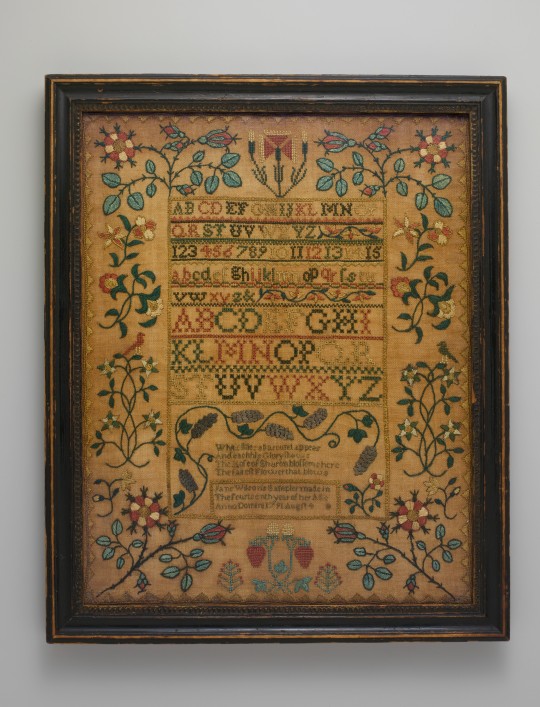
sampler embroidered by Jane Wilson, 14, in 1791 (MMA 2010.47)
or a picture:

unfinished embroidery of David and Abigail, British, 1640s-50s (MMA 64.101.1325)
That is, something meant to hang on the wall for no real purpose.
These are forms of schoolwork, basically. Samplers were made by young girls up to their early teens, and needlework pictures were usually something done while at school or under a governess as a showpiece of what was being learned - not just the stitching itself, but also often watercolors (which could be worked into the design), artistic sensibility, and the literature, history, or art that might be alluded to. And many needlework pictures made in schools were also done as mourning pieces, sometimes blank, for future use, and sometimes to commemorate a recent death in the family. A lot of them are awkward, clearly just done to pass the class, but others are really artwork.
Many schools for middle- and upper-class girls taught the making of these objects (and other “ornamental” subjects) alongside a more rigorous curriculum - geography, Latin, chemistry, etc. At some, sewing was also always accompanied by serious reading and discussion. (And it would often be done while someone read aloud or made conversation later in life, too.)
Once done with their education, women generally didn’t bother with purely decorative work. Some things that fabric could be embroidered for included:
Jackets
Bed coverings and bedcurtains
Collars and undersleeves
Pelerines
Neck handkerchiefs and sleeve ruffles
Screens
Upholstery
Handkerchiefs
Purses, wallets, and reticules
Boxes
Book covers
Plus other articles of clothing like waistcoats, caps, slippers, gown hems, chemises, etc. Women’s magazines of the nineteenth century often gave patterns and alphabets for personal use.
(Not to mention late nineteenth century female artists who worked in embroidery, but that’s something else.)
You could purchase all of these pre-embroidered, but many, many women chose to do it themselves. There are a number of reasons why: maybe they wanted something to do, maybe they felt like they should be doing needlework for moral/gender reasons, maybe they couldn’t afford to buy anything - and maybe they enjoyed it or wanted to give something they made to a person they loved. That firescreen above was embroidered by Marie Antoinette, someone who had any number of other activities to choose from. It’s no different than people today who like to knit their own hats and gloves or bake their own bread, except that it was way more mainstream.
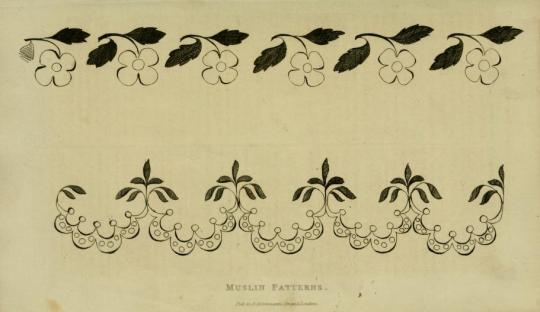
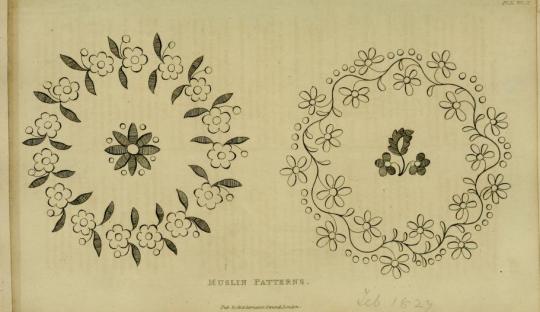
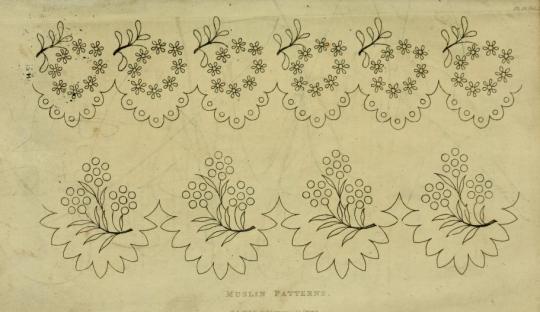
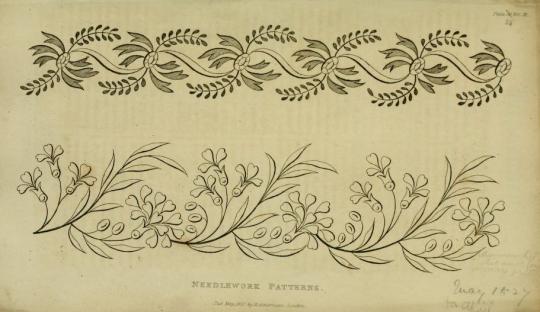
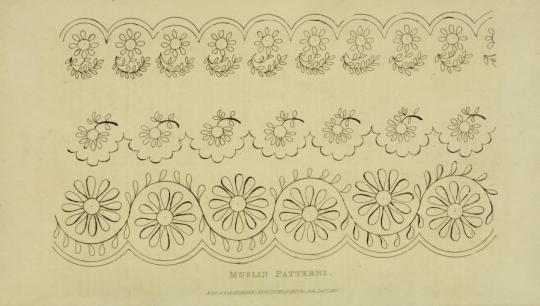
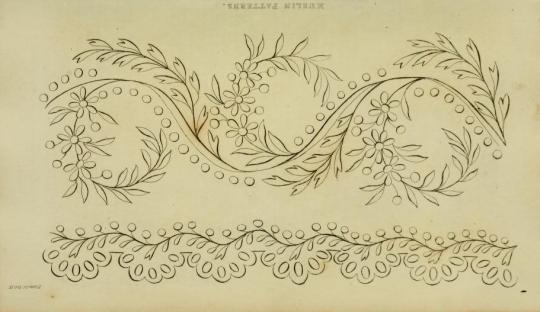
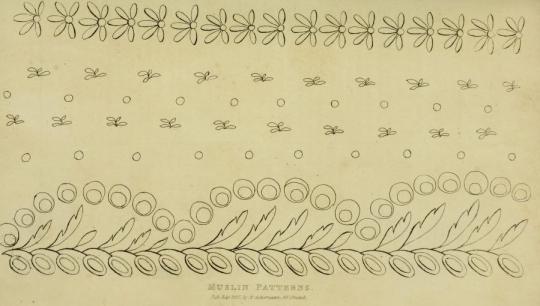
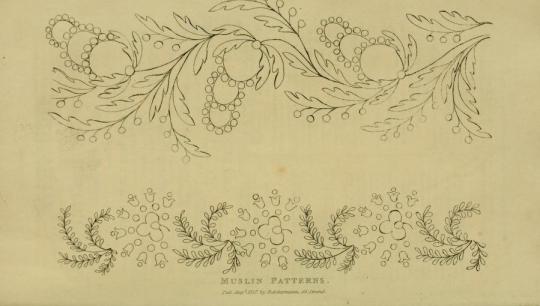
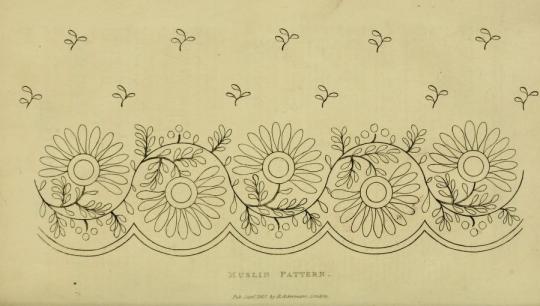
embroidery patterns from Ackermann’s Repository in 1827 - they could be used on dresses, collars, handkerchiefs, etc.
Second: needlework wasn’t the only “useless” thing women were expected to do
Ignoring the bulk of point one for now and the value of embroidery - I mentioned “ornamental subjects” above. As many people know, young women of the upper and middle classes were expected to be “accomplished” in order to be seen as marriageable. This could include skills like embroidery, drawing, painting, singing, playing the piano (as well as other instruments, like the harp or the mandolin), speaking French (if not also Italian and/or German), as well as broader knowledge and abilities like being well-versed in music, literature, and poetry, dancing and walking gracefully, writing good letters in an elegant hand, and being able to read out loud expressively and smoothly.
This wasn’t a checklist. As the famous discussion in Pride and Prejudice shows, individuals could have different views on what actually made a woman accomplished:
“How I long to see her again! I never met with anybody who delighted me so much. Such a countenance, such manners! And so extremely accomplished for her age! Her performance on the pianoforte is exquisite.”
“It is amazing to me,” said Bingley, “how young ladies can have patience to be so very accomplished as they all are.”
“All young ladies accomplished! My dear Charles, what do you mean?”
“Yes, all of them, I think. They all paint tables, cover screens, and net purses. I scarcely know anyone who cannot do all this, and I am sure I never heard a young lady spoken of for the first time, without being informed that she was very accomplished.”
“Your list of the common extent of accomplishments,” said Darcy, “has too much truth. The word is applied to many a woman who deserves it no otherwise than by netting a purse or covering a screen. But I am very far from agreeing with you in your estimation of ladies in general. I cannot boast of knowing more than half-a-dozen, in the whole range of my acquaintance, that are really accomplished.”
“Nor I, I am sure,” said Miss Bingley.
“Then,” observed Elizabeth, “you must comprehend a great deal in your idea of an accomplished woman.”
“Yes, I do comprehend a great deal in it.”
“Oh! certainly,” cried his faithful assistant, “no one can be really esteemed accomplished who does not greatly surpass what is usually met with. A woman must have a thorough knowledge of music, singing, drawing, dancing, and the modern languages, to deserve the word; and besides all this, she must possess a certain something in her air and manner of walking, the tone of her voice, her address and expressions, or the word will be but half-deserved.”
“All this she must possess,” added Darcy, “and to all this she must yet add something more substantial, in the improvement of her mind by extensive reading.”
Mr. Bingley feels that a woman is accomplished if she has the ability to do a number of different arts and crafts. Miss Bingley feels (or says she feels) that it goes beyond specific skills and into branches of artistic attainment, plus broader personal qualities that could be imparted by well-bred governesses or mothers. And Mr. Darcy, of course, agrees with that but adds an academic angle as well.
But what ties all of these accomplishments together is their lack of value on the labor market. A woman could earn a living with any one accomplishment, if she worked hard enough at it to become a professional, but young ladies weren’t supposed to be professional-level good because they by definition weren’t going to earn a living. All together, they trained a woman for the social and domestic role of a married woman of the upper middle or upper class, or, if she couldn’t get married, a governess or teacher who would share her accomplishments with the next generation.
(To be fair, almost none of the trappings of an upper-middle/upper class male education had anything to do with the kind of career training that college frequently is today, either. Men were educated to know the cultural touchpoints of their class and fit in with their peers.)
There are reasons that an individual person/character might specifically object to embroidery, but it was far from the only “useless” thing that an unconventional heroine would be required to do against her inclination by her conventional mother/grandmother/aunt/chaperone. Embroidery stands out to modern audiences because most of the other accomplishments are now valued as gender-neutral arts and skills.
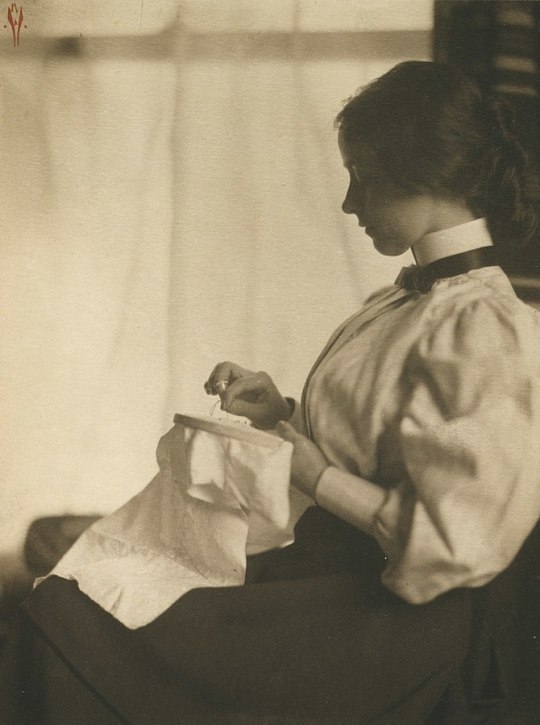
“The Embroidery Frame”, by Mathilde Weil, ca. 1900 (LOC 98501309)
So, some thoughts for writers of historical fiction (or fantasy that’s supposed to be just like the 19th/18th/17th/etc century):
- If your heroine doesn’t like embroidery, she probably doesn’t like a number of other things she’s expected to do. Don’t pull out embroidery as either more expected or more onerous than them. Does she hate to sit still? I’d imagine she also dislikes drawing and practicing the piano. Would she prefer to do academic subjects? She probably also resents learning French instead of Latin, and music and dancing. Does she hate enforced femininity? Then she’d most likely have a problem with all of the accomplishments.
- If your heroine just and specifically doesn’t like embroidery, try to show in the narrative that that’s not because it’s objectively bad, and only able to be liked by the boring. Have another sympathetic character do it while talking to the heroine. Note that the hero carries a flame-stitched wallet that’s his sister’s work. Emphasize the heroine’s emotional connection to her deceased or absent mother through her affection for clothing or upholstery that her mother embroidered - or through a mourning picture commemorating her. There are all kinds of things you can do to show that it’s a personal preference rather than a stupid craft that doesn’t take talent and skill!
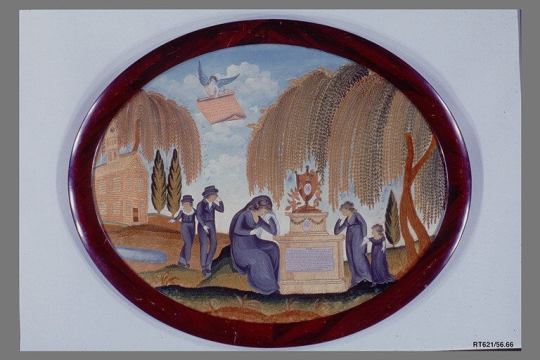
mourning picture for Daniel Goodman, probably embroidered by a Miss Goodman, 1803 (MMA 56.66)
#history#women's history#writing#embroidery#19th century#18th century#17th century#victorian#georgian#regency
1K notes
·
View notes
Text
six hundred and seventy five: 2019
The annual year in review entry. I’ve written this post nine times, one for every year of this decade. I reread the very first one, from 2010, aloud to my mother the other night. My writer’s voice is so chipper in it, so young. I had just started college. In so many ways, I had barely lived. I was about to list off all the things I hadn’t yet done, as an explanation. But the truth is, even now, having done at least a few of those things, I still have barely lived. I want to remember that, to bottle up that feeling of wistfulness for a younger self, that protective inclination to wait for things to get better and worse, because I know I still need it. There is still so much I haven’t done, so much I want to do. Ways to spend the next few decades, if I’m lucky enough to have them.
Last year at this time, I think I was home alone with Cory. I can’t remember it perfectly. The past few years have blurred together in that regard. Was this the year that Mariah Carey sang badly during Dick Clark’s Rockin’ Eve? I’ll look it up after I write this. The point is, I welcomed in the new year alone, but not really, and then received a flurry of text messages from my mother and brother and so many friends. January passed in New York for the most part. I went to my favorite bar every week, first with Liz and then with Vivian. I got bad news one night about a fellowship and the next night, I found out that my fellowship paper was selected for an academic conference. I felt like Even Steven, losing one thing, gaining another. By the time I made it back to Boston, for the spring semester, it was the end of the month. That last week became so important, especially in retrospect. I met a man from the past in one of my classes, someone I knew vaguely from my time at Swarthmore. February was about him. And so was March and April and May.
I used to keep details off my blog, because I was afraid of people reading and piecing together the truth. I wanted to be polite and coy. Now, I guess I don’t really know who is still reading this. And maybe I also don’t care. If you know me, really know me, you know what happened. If you don’t, well: in February, this blast from the past man sent me an email about coffee. I said yes and we spent hours together, walking around Cambridge, the pink sky of the new moon above our heads. Then he asked me to go to the Arnold Arboretum. We never went. Instead, we talked for hours in another coffee shop. Uncharacteristically, I asked to see his place and after I met his roommates, in-between bites of fig newtons, he leaned over and whispered: Can I kiss you? His tongue slipped into my mouth in the darkness of his living room. He kissed me again on his doorstep and my head spun on the lyft ride home. I threw up hours two hours later, from the hunger induced migraine. I didn’t eat at all that day, except for the cookies in his house and the lettuce wrapped in turkey at midnight in my bed. Of course I threw up. The next week, we went out again. Later, in my bed, wrapped up in his wiry, tattooed arms, I was just happy. That was when he told me, that he’s an alcoholic and an addict. It should have changed something for me, it should have set off an alarm. It didn’t.
Four days later, he relapsed. He had cancelled and then un-cancelled our date. I met him at a Starbucks and on the T back to his place, our legs touched. I felt bad, terrible in a way that I couldn’t name. We watched some Netflix original reality show and then, in his bed, we had sex. We kissed. He told me about his history of self harm and severe mental illness. I talked about my own trauma. It was not a good date. I couldn’t sleep after. In the morning, after he made me eggs and I realized he would not be going to his next AA meeting, I asked, trying not to cry, Will I see you again? He said of course, and then he backed me into a wall and kissed me with a boyish glee. I felt relieved and stupid. Three days later, he told me he couldn’t make it to my place for dinner. He said that he felt like he had encountered me in the wrong moment of his life, that he couldn’t stop drinking, that he was checking himself into a facility, that I meant something to him. I cried that whole weekend. I barely ate. No one could help me.
It was like this for months. Every interaction between us charmed and hurt me. When he was doing well, I was joyous. Otherwise, I was miserable. I skipped meals. I had nightmares. I cried alone in my room, on walks around campus. I lost weight and inches. I felt like I was dying. Somehow, in that strange internal darkness, I realized I was not okay. I wanted to be okay, more than anything. I felt bad all the time and I was tired of feeling bad. In April, I started seeing a therapist. In May, I started seeing a nutritionist. I went to a support group meeting and read literature about codependency. I felt like it was my fault, my emotions, my own shit. I called my mother and Vivian and Michael. I was defensive about this guy. Addiction is a disease, an addict is not a Bad Person, but he can be a deeply troubled person.
And then, after all of that, one day in May, he told me that he had gotten involved with someone. It was the way he said it. Two weeks before, in his bed, he had asked if he could undress me. I told him then, sitting outside the Harvard Square T stop, that he was a coward. He flinched, like I hit him. I said, I thought I loved you, but you aren’t who I thought you were. I guess, I didn’t really love you then. I also said, I’m sorry if that hurt you, I don’t mean to hurt you. And he told me, his eyes glassy, that I meant something to him. Of course, I knew that. Of course, it didn’t matter.
I skipped some stuff, or I made it seem small. In May, when I went to that support group meeting, I actually spoke in the group. I said, Every day I feel this intense pressure to try my best. I want to be kind and generous and patient and brave and good. But it’s so much work, being that way. Sometimes, I can’t do it. Sometimes, I just don’t have it in me. On those days, I want to give myself permission, to simply try. On those days, “best” is not the goal. The goal is to keep at it, whatever it is. So, I went to classes and socialized and asked for help. I told my therapist in April, that coming to therapy meant that I wasn’t hopeless, that I hadn’t given up on myself. In March, I presented my paper at an academic conference, as a single author. I was also on a poetry panel with Trista, Amanda, Cyrus, and Iain. How insane to be there with them, to be included in a family of poets.
In June, the man disappeared, moved away without a real goodbye. At the time, I was devastated. I can’t describe the feeling of abandonment, but I thought: love is not for me. I thought it through June and July. I went out with a series of inconsequential men. There’s a photo I saved on my phone, after one of those dates. He wasn’t a bad guy, just boring, just rude. I came home and cried until my mascara had spread across my face. I went back to New York in July, and in between visiting with friends and volunteering at camp, I had a hilarious summer fling, not a story just something for friends to gossip about. Even then, I was lonely. I didn’t run away from it, though. I recognized it. I thought, I should keep trying. Maybe I would find a good thing.
August had me dog-sitting and transliterating Sanskrit books and gearing up for the final year of my master’s degree and looking into various doctoral programs. It was also when I went on a first date with this handsome, funny, smart, and unbelievably kind man, who would eventually become my boyfriend— how weird that word looks here, how funny that it means something to me after all these years. It has felt like emotional whiplash, this year, loving two men. Looking back, it should be easy to say oh that wasn’t really love. But that’s not true. I loved two people this year, just so differently. If the first love made me nervous, the second makes me calm. I was on a bus back to Boston after Thanksgiving and the traffic was terrible and I felt an ugly irritation bubble inside me because of my seat neighbor. I thought about my boyfriend then, his easy smile, how he rubs my back when I cough. What a small thing, but I felt lighter just thinking about it. It sounds silly and cheesy, I know. But I don’t want to belittle it, not here. I don’t think I have ever really felt so good to be with someone before. It is so new to me, this joy, this stability. I don’t want to take it for granted.
I wrote in my journal a few days ago, that I’m not sure if this relationship is good because he is so good, or because I have done the work of trying to lead a healthier life. Is this just a byproduct of one or the other? Or, as Liz says, is this what happens when two Virgos come together? I don’t know, I loved a Virgo once before, and I don’t remember ever feeling this light. This is different. He is different.
In September, I went to Denmark for my ten year reunion camp reunion. I started this blog right after that iconic summer, 16 and strangely tan from all that northern sun. From October through December, I applied to doctoral programs. Yes, again. We’ll see what happens. For the first time, I don’t really know what I want in my future, but I’m trying to trust in the universe to guide me there. I know I want love. It’s hard for me to admit that. I used to scorn women who named that in their list of goals, but it’s important, as important as everything else. I want to feel close to someone. I want a life of meaning, even if it just means something to me. I want to write. I hate that I ever stopped doing that. I feel sometimes like I have wasted my potential there, in writing professionally. I hope that’s not true. I am not ready to give this up, this dream that could still turn into something.
Something that I said a lot this year: whatever happens, I’ll be okay. During a depressive episode a few weeks ago, I thought I was losing everyone in my life, that everyone secretly hated me. What I told myself then, was not that I was crazy or wrong, but that I could deal with it. It’s true. If that happened, I could deal with it. But I hate that response. I wish I fought more. I wish I didn’t turn over so easily. Not that I think I could change someone’s mind. But I wish I didn’t just accept the worst case scenario. Anyway, maybe it’s strange even to debate this. The truth is so far from the worst case scenario. In fact, right now the truth is I am so fucking lucky. Ten years ago, I was just a high school student whining on the internet. Today, I am a Harvard graduate student; I am an author; I have a publication list that makes professors raise their eyebrows; people care about what I write and think; there are people who love me, really love me; I am healthier and happier than I ever thought I deserved to be. I worked for this. I earned it. I didn’t give up on me.
I can’t predict anything about the future. I’m always so hilariously wrong. Mostly I hope I never stop trying. 2020 still sounds like a fiction, but it’s real, it’s happening, it’s here. It’s funny, I only ever feel that surprised by joy. I hope that never changes.
#2019#new year#new year's eve#2020#nye#real life#life lessons#love#hope#growing up#time#memories#remember that?#milestones#grad school#friends#liz#friendship#virgo#harvard#writing#recap#health#self care#self love
17 notes
·
View notes
Text
How 5 Simple Habits Made Me Love My Life More
“Good habits are worth being fanatical about.” ~John Irving
Your habits are directly related to the quality of your life. Good habits lead to joy and fulfillment in your life, while not-so-good habits leave you yearning for your life to be different.
I think I always knew that, I just wished I took it to heart sooner. Better late than never, right?
Gretchen Rubin, author of Better Than Before: What I Learned About Making and Breaking Habits, says that “Habits are the invisible architecture of our daily life. We repeat about 40 percent of our behavior almost daily, so our habits shape our existence, and our future. If we change our habits, we change our lives.”
I’ve spent far too much time in my life languishing in worries and regrets, wondering why life had to be so hard. I looked for outside sources to come in and save me. No rescuer ever came, at least not one that made a permanent difference.
I’d always wind up on the same boat: wondering why others seemed so content with the lives they were leading while I continued to have a burning desire for something different—something I really couldn’t even name, though I tried in vain to do so.
I set big goals and made big plans that I was certain would make all the difference for me. Usually, my big goals and big plans wouldn’t live beyond the next new moon. Even when they did, though, the things that I thought would make me happy didn’t. The things that I thought would bring me peace only annoyed me for their utter lack of peace-creating properties.
By profession, I’m a strategist. I look at all the many things that contribute to situations being a certain way and explore ways to move the situation toward where I want it to be. Turns out, sometimes you don’t have to overhaul anything; sometimes, small, simple tweaks can make a big difference.
As the saying goes, it takes large sails to move a large ship, but the captain need only make a small adjustment to the rudder to change the direction. The other part of the saying is there’s no point in adjusting the rudder if the ship is not moving; you won’t go anywhere.
Your daily habits are the small rudders hat can help you move your life in the direction you wish. Choosing good habits day after day is the movement required to experience the positive life changes you’re seeking.
I like to think of myself as an intelligent person, but what I neglected to see in my own life is that the smallest tweaks done day in and day out have the power to move the mountains I want moved. When my eyes opened to the power of small changes practiced daily, miracles began to unfold in my life.
Below are some of the simple daily habits I’ve worked to incorporate into my life that are making such a huge difference for me.
1. Meditation
Yeah, yeah, I know. Everyone says meditate, but did you ever consider that maybe all those meditation-lovers are offering an you an insider’s tip (pun intended) that in fact is actually priceless?
I have an overactive mind, as many people do. It loves to tell me about all its worries and warn me of threats that in reality aren’t all that threatening—nothing more than a mouse posing as a monster most of the time.
My mind loves to relive situations and conversations over and over and over; it’s so tiring! I’ve found that the antidote to my endless chattering mind is daily meditation.
I don’t do anything complicated. I just sit in a relaxing position, tune into serene instrumental music on Spotify, and focus on my breath. Anytime I notice that my mind is wandering (as it always does), I return my focus to my breath. In times of silence answers seem to arrive to incredibly insightful questions I didn’t even know I should ask.
2. Kind, loving self-talk
In the past, my inner dialogue wasn’t all that friendly. In fact, I was my own worst enemy, a relentless bully whose malicious words would leave me disheartened and unable to face the world with any sense of self-worth or confidence.
I didn’t come by this demeaning self-talk accidentally. Its roots go back to my childhood.
I grew up in a Roman Catholic home with seven children (another sibling died before I was born) and two overworked, exhausted parents who were flat broke all the time.
My father struggled with alcohol addiction and mental illness. This, along with my mother’s enabling patterns plus her own low self-esteem and depression issues, defined how the house was run.
The focus of the entire household was on managing life around dad’s issues.
Growing up, it seemed to me that nothing I ever did was good enough for my dad, though I tried so very hard to please him. I craved his love and positive attention. He either ignored me or criticized me, and when he criticized me he often did so in the most brutal tone.
I took to adopting that brutal tone in my inner dialogue and kept up the cruel inner monologues for years and years. I rationalized that I was just keeping my standards high, because who wouldn’t want to have high standards, right? A father would only criticize his daughter to help her improve, right?
So I kept criticizing myself; it never occurred to me that dad lashed out at me because his whole life seemed like a mess, so by God, the one thing he would have control over was his children.
There I was as an adult, using unrelenting, vicious self-criticism as a way to be perfect so I could get the love and attention I sorely wanted from the people in my life. It was a strategy that was never going to work; it had to go.
After examining my bitter, demeaning inner voice, I realized that I would never treat another human being this way, so why was I permitting this type of untenable talk go on inside me? I deserve better—we all do!
Now when those critical thoughts come up I’m patient with myself without buying into the scolding voice that’s offering up the hypercritical self-assessments.
I look at the scared girl behind those ugly comments and extend my deepest love to her. You see, while I refuse to allow my inner critic to talk to me in vile ways anymore, I also recognize the only reason I ever talked to myself that way was out of a deep need for belonging and protection. There was a call for love behind those ugly words, and now I simply acknowledge that deep desire for self-love without chastising the hurting girl who was trying to get my attention in the only way she knew how.
3. Follow the five-second rule
I love Mel Robbins, and the day I learned about her five-second rule was a very important day in my life. (And I’m not talking whether it’s still safe to eat food that’s only had five seconds of contact on the floor—that’s a whole different discussion!)
In a nutshell, here is Mel Robbins’ five-second rule, in Mel’s words: “The moment you have an instinct to act on a goal you must count five-four-three-two-one and physically move or your brain will stop you.”
So, you’re not a “morning person” but you have a goal of getting up earlier in the morning? Then the moment your alarm clock goes off, count five-four-three-two-one and jump out of bed. No more hitting the snooze alarm.
Yes, in the moment of those early morning hours, of course you’d rather stay in that warm comfy bed—who wouldn’t? But staying in bed doesn’t align with your bigger goals, and getting up does. If you move within five seconds, you’ll move toward your bigger goals. If you don’t move and allow your clever mind to talk you into staying in bed for “just a bit more,” you’re sunk.
If you want to change your life by getting up earlier so you can write that blog you want to write (a-hem, what I’m doing now) or do that exercise you know your body needs, then make those goals your priority over an extra thirty minutes of sleep and use the five-second rule to help you get your body out of bed.
Adopting the five-second rule is one of the best habits I’ve ever taken up. For the sake of full transparency, I admit I’m not always successful at sticking to the rule, but the more I try, the more I succeed.
“If your habits don’t line up with your dream, then you need to either change your habits or change your dream.” ~John Maxwell
4. Feed my mind
I’ve always considered myself to be a learner, though in actuality I get lazy about learning. It’s hard to improve your life if you’re never giving your brain any new information. Feeding my mind on a regular basis has become a top priority for me.
My “feeding my mind” goal looks something like this: one retreat a year, one book a month (that I can either read or listen via audio), one podcast a week, and one smart article on something I want to learn about each and every day. I’ve found that starting the process builds momentum; I often crush my minimum goals!
Feeding my mind in healthy ways also means giving up some unhealthy habits. I’m extremely careful about how much news I watch nowadays. While I don’t want to keep my head in the sand, I find it’s important to limit the number of negative messages I allow into my mind, and news channels are notorious for going over the same disturbing stories again and again. I make time in my days for my extra reading and personal growth activities by getting up earlier and limiting my Netflix and HBO time.
I’ve also modified my budget so I can afford the audiobooks and retreats I want to buy. My clothing and dining out budget is about half of what it used to be, and it’s a trade-off I’m happy to make.
The habit of feeding my mind is opening up whole new worlds for me. I can’t tell you how often I’ve read about something and the perfect opportunity comes up for using what I’ve learned in both my professional and personal life. Louis Pasteur said, “Fortune favors the prepared mind,” and I couldn’t agree more!
5. Do something outside my comfort zone at least once a week
If I were a more ambitious soul, I might put a “once a day” rule on this habit, but for now once a week works nicely for me. The habit of doing the same things the same way every day is life draining, while the habit of stretching outside your comfort zone regularly is life expanding. I’d rather see my life expand rather than to contract and shrivel, thank you very much.
Today, I regularly practice being brave—allowing myself to be seen, allowing myself to be vulnerable and unskilled at new things. I don’t tiptoe outside my comfort zone anymore; I’m even willing to take huge leaps.
I quit a job that I’d been in for twenty-two years without having the next job lined up. I moved 2000 miles from family and friends to live in a beautiful part of the world where I’ve always dreamed of living.
I now work in freelance, consulting, and coaching roles, which means my income fluctuates a lot. I’m not always certain how much money I’ll earn each month; I could have never tolerated that degree of uncertainty before.
It’s surprising how much your life can transform in miraculous ways once you’re willing to not be perfect in your own little world but instead actively choose to be imperfect in a world that might judge you.
When you take risks that might leave you flat on your back, but also might enable you to soar. I’ve found that bravery is rewarded, maybe not always in the moment, but always in time. I encourage you to be brave; it’ll change your life!
About Janette Novak
Janette a confidence coach and the founder of Believe And Create, BelieveAndCreate.com, a personal development initiative that helps people believe in themselves more fully and create lives that they love. Janette also owns Illuminate Marketing Communications IlluminateMarCom, a digital marketing agency that specializes in content marketing. She lives in Flagstaff, AZ.
Web | More Posts
Get in the conversation! Click here to leave a comment on the site.
The post How 5 Simple Habits Made Me Love My Life More appeared first on Tiny Buddha.
from Tiny Buddha https://tinybuddha.com/blog/how-5-simple-habits-made-me-love-my-life-more/
0 notes
Text
Guest Post: “Waiting to Die”
NOTE: This is a guest post by Kenneth Ring, PhD. Dr. Ring is an internationally recognized authority on near-death experiences. His writings on this phenomenon include five books and nearly 100 articles about near-death experiences. He is the co-founder of the International Association for Near-Death Studies (IANDS) and is the founding editor of the Journal of Near-Death Studies. Dr. Ring’s book Heading Toward Omega, the Journal of Near-Death Studies, and IANDS were all very important to me following my own NDE in 1993, and I’m honored to have him as a guest.
Waiting to Die
© 2017, Kenneth Ring
The bright realization that must come before death will be worth all the boredom of living.
– Ned Rorem
What’s it like, waiting to die? Of course, it’s different for everyone. I can only say what it’s like for me. On the whole, it’s rather boring.
Don’t get me wrong. I still have many pleasures in life and – knock on silicon – I’m lucky not to be suffering from any fatal illness, though if I were, that would certainly add some drama in my life. I could then follow the example of the poet Ted Rosenthal, who after contracting leukemia, joyfully called his friends and said, “Guess what’s happened to me!” Well, no thanks. I’ll take my boring life any day and intone a hymn of gratitude every morning I wake up with only the ordinary indignities of an old man – coughing, wheezing and sneezing, and, oh, my aching back!
But still….I’m used to having productive work — writing books, helping other authors with their books, being involved in various professional pursuits, and so forth. But recently I published my last book, which I puckishly entitled, Pieces of My Mind Before I Fall to Pieces, which was a kind of potpourri of stories and interests from my later years, and just after that I wrote what I expect to be my last professional article, the foreword to a colleague’s memoir. Now what? More precisely, what do I do with my time now that I have clearly entered the epilogue to my life? Honestly, I feel as if I have stepped over the threshold into my afterlife before dying.
Of course, I can watch films – I’ve become quite a “film buff” in my later years; I still have interesting books to read. I am blessed with a wonderful girlfriend. Still, since life has become a spectator sport for me, and I can no longer travel, except locally, I find that I am spending more time on my sofa, honing my couch potato skills, watching sports. Yet I must confess that even they have lost a good deal of their zest for me. My home town baseball team, The San Francisco Giants, finished in the cellar last year; in golf, Tiger has gone away; in basketball, Michael Jordan is long gone; and in tennis, which is now the only sport I follow with some avidity, it is chiefly because of the great Roger Federer. Nevertheless, I can only wonder how long he can at 36 continue to produce one miracle after another? Surely, he, too, will begin his inevitable decline soon, and with his descent from the heights of glory, my interest in tennis will also flag. So what will be left then? I will tell you.
The body. Mine. It has already become my principal preoccupation and bête-noire. These days, I can’t help recalling that St. Francis referred to the body as “brother ass.” It seems I now spend most of my time in doctors’, chiropractors’ or dentists’ clinics, as they strive to preserve my decaying body parts by inflicting various forms of torture on me that would even impress Torquemada, or doing physical therapy in what is most likely a vain attempt to delay the encroaching onset of wholesale physical deterioration. Really, is this any way to run a navy? There are many days when I think the only surgery that will preserve me would be a complete bodyectomy.
Well, okay, I realize this is only par for the course of the everyday life of an octogenarian. Wasn’t it Bette Davis who famously said “old age is no place for sissies?” It isn’t for wimps like me either, it seems. (I can often be heard crooning, “turn back the hands of time….”) Still, I wouldn’t go so far as the saturnine Philip Roth who said that old age is “a massacre.” I guess at his point I find myself somewhere between Davis and Roth, but the waiting game still seems to be a losing proposition and I might very well come to think of my current boredom as the halcyon days of my decline.
Nevertheless, consider a typical day in the life of this old wheezing geezer.
It begins with the back. Every day does. In the morning, you get up, but your back doesn’t. It hurts. Even though you take a hot shower before bed, by the time you wake up your back has decided to take the day off. When you try to use it, as for example, when you bend over to pick up the comb you’ve dropped into the toilet, it begins to complain.
And finally, it gets so bad, you have to lie down on your once neatly made bed, remove half your clothing, and apply some ice to it while listening to mindless music and cursing the day when some enterprising hominid decided it would be a good idea to change from the arboreal life to a bipedal one. Big mistake. The next one was the invention of agriculture, but never mind. We were talking about the back and its vicissitudes.
Nevertheless, a little later, you decide to take your body out of a spin. “Don’t look back,” the great Satchel Paige advised, “something might be gaining on you.” In my case, it’s the man with the scythe whom I hope to outstrip for a few more years.
Of course, the back, which had only been moaning quietly before now begins to object vociferously, asking sourly, “what the hell are you thinking?” Nevertheless, you press on, thinking your will will prevail, and your back can go to hell.
But the next dispiriting thing you notice are all these chubby old ladies whizzing by you as if they are already late for their hair appointments. How humiliating – to be passed by these old biddies! You think about the days in junior high when you were a track star, setting school records in the dashes and anchoring the relay races, which you used to run in your bare feet. Then you ran like the wind. These days, you are merely winded after trudging a hundred yards.
When you can go no further, you turn around only to become aware of still another distressing sight. Actually, it is your sight – or lack of it. It ain’t working. You could see pretty well after your corneal surgery last year, but now you can’t see worth shit. What is that ahead of you? Is it a woolly mammoth, a Saint Bernard or merely a burly ex-football player? Where are the eyes of yesteryear? Gone missing. Well, they didn’t give me any guarantees as to how long my vision would last before it decided, like my back, to begin to object to its continued use outdoors. The way of all flesh doesn’t stop with the flesh; it continues with the cornea, so now I am cursing the darkness in the middle of a miasmal morning.
I finally arrive home in a disconsolate mood, but now it is time to hop onto my stationary bike, which is the only kind I have ever been able to ride since my balance is worse than that of an elderly inebriate on New Year’s Eve. I used to be able to pedal reasonably fast and for a long time. But lately someone must have snuck in to affix some kind of a brake to the bike since suddenly it seems that I am pumping uphill at an acute angle. Heart rate is up, speed is down, my old distance marks are a treasured memory, which I can only mourn. All I am aware of now is the sound of someone huffing and puffing.
At last the torture is over, but now I really have to piss. That damn enlarged prostate of mine has no patience – it must be satisfied now! I race into the bathroom, unzip my fly before it is too late, and make sure, because I have my girlfriend’s admonitions in my ears as I piss that she will behead me if I continue to treat the floor as an auxiliary pissoir, I am pissing very carefully into the toilet bowl. Of course, these days, my urinary stream is a sometimes thing. It starts, it stops, it pauses to refresh itself, it pulses, stops, dribbles, starts up again with what seems to be its last mighty effort to produce something worthwhile and finally drips itself into extinction.
I’m relieved, however, because at least I haven’t soiled my pants this time. But wait. What is that? Pulling up my pants, I can feel some urine on my left thigh. How the hell did it get in there? Is there some kind of silent secondary stream that runs down the side of my leg when I am otherwise preoccupied with trying to keep my penile aim from going astray?
Now I have to find a towel to wipe off the offending liquid and just hope my girlfriend won’t say, when I return to the kitchen, “what is that funny smell, darling?”
Well, you get the idea. Life is no longer a bowl of cherries, or if it is, some of them are turning rotten. And naturally I can’t help wondering how long I have to go before I really cross that final threshold over the unknown. For years, I’ve joked that I’ve wanted to live to be 1000 – months – old. Now I’m at 984 and counting. I’m getting close, and it’s no longer just a joke.
And of course I now also have to wonder what will be next? I mean, after I die, assuming I will ever get around to it.
Well, in my case, I have some inklings because I’ve spent half my life researching and writing about near-death experiences and in the course of my work I’ve interviewed hundreds of people who have told me what it was like for them to die – at least for a few moments – before returning to life. And what they have told me has been, I am frank to admit, profoundly reassuring.
I remember one woman who said that in order to grasp the feeling of peace that comes with death you would have to take the thousand best things that ever happened to you, multiply them by a million and maybe, she said (I remember her emphasis on the word, “maybe”), you could come close to that feeling. Another man said that if you were to describe the feelings of peace that accompanied death, you would have to write it in a letters a mile high. All this might sound hyperbolic, but I have heard such sentiments from many near-death experiencers. Here’s just one more specific quote from a man I knew very well for many years, telling me what it was like for him to die:
It was a total immersion in light, brightness, warmth, peace, security….I just immediately went into this beautiful bright light. It’s difficult to describe….Verbally, it cannot be expressed. It’s something which becomes you and you become it. I could say “I was peace, I was love.” I was the brightness. It was part of me….You just know. You’re all-knowing – and everything is a part of you. It’s just so beautiful. It was eternity. It’s like I was always there and I will always be there, and my existence on earth was just a brief instant.
After listening to so many people describe what it was like for them to die, it is easy for me to imagine what it might be like for me – for anyone – to take that final journey. And many great writers have said much the same thing as those I have interviewed have told me about what is in store when we die. Walt Whitman, for example, who wrote “And I will show that nothing can happen more beautiful than death.” And Herman Melville, with even more eloquence, said, “And death, which alike levels all, alike impresses all with a last revelation, which only an author from the death could adequately tell.” It seems that in our own time, these authors from the death are today’s near-death experiencers, and the revelations they have shared with us appear fully to support the claims of these famous 19th century American authors.
So having immersed myself in the study of near-death experiences for so many years, I’m actually looking forward to my passage when my time comes. Still, I’m not looking forward to the dying part. In that regard, I’m with Woody Allen who quipped, “I’m not afraid of death; I just don’t want to be there when it happens.” I just hope that all those stories I’ve heard about how wonderful death itself is aren’t some kind of a spiritual trompe l’oeil, a cosmic joke played by a malevolent god. Or as that marvelously antic diarist and composer, Ned Rorem, whimsically jested, “If, after dying, I discover there is no Life After Death, will I be furious?”
Of course, when I am faced with the imminence of death, I hope I’ll be able to comport myself with some equanimity, but who knows? Think of Seneca who wrote so eloquently about suicide, and then horribly botched his own. Well, naturally, I’m not planning to hasten my death by such extravagant means, though I wouldn’t refuse a kind offer of a little help from my doctor friends to ease me on my way if I’m having trouble giving birth to my death. It can, after all, be a labor-intensive enterprise. I just hope I can find myself on that stairway to heaven I’ve heard so much about and can manage to avoid a trip in the opposite direction.
Meanwhile, when did you say Federer will be playing his next match?
Books by David J. Bookbinder
Paths to Wholeness: Fifty-Two Flower Mandalas
52 (more) Flower Mandalas: An Adult Coloring Book for Inspiration and Stress Relief
52 Flower Mandalas: An Adult Coloring Book for Inspiration and Stress Relief
Paths to Wholeness: Selections (free eBook)
… and coming soon, The Art of Balance: Staying Sane in an Insane World
http://ift.tt/2jZA4o8
http://ift.tt/2oskRQ1
http://ift.tt/2ospoC2
http://ift.tt/2osp7Pj
from Guest Post: “Waiting to Die”
0 notes
Text
Offside
-Mat-
It’s slowly becoming darker as I walk onto the field. I don’t know if we are allowed to be on the field at dinner time. Rae had given me permission to miss Fish Fridays from now on. Sometimes being alone is just what I needed. Especially after the reports like this night.
We had won, but instead of feeling great about it, it didn’t.
As expected the other guys struck up for the work I did, even though Raena knew Fitz and I had done most of the work. While calling out that our group had won on the report, the other guys had just accepted the price as if it was really a team effort. Raena had apologized for it, but we waved her off. This wasn’t her doing either, it just felt awful.
So to clear my head soccer felt like the only option to do. It was always my only option to do. Fifa was nice and all, but nothing better than to play for real.
I zip my jacket close and do a warming up, knowing that if I wouldn’t, the chance of injuries only increase. And while doing so, the bad feeling doesn’t seem to leave me. I’ve always had these moments that at some point I just start overthinking. I could drive myself mad with it sometimes at night. And this time they seemed to do as well.
‘’Give it back Felix! It’s not funny anymore!’’ My brother kept laughing as he passed the football to Neels who held it high in the air, far out of my reach. ‘’Come on, please.’’ my pleading only seemed to have made them laugh harder.
‘’You gotta jump higher, little one.’’ Neels called as he threw the ball over my head once again in the hands of my other brother. I tried jumping for it, hitting it out of the air but I was simply too little. I wasn’t tall or broad like them. I had a runners body, which made me fast. if I could just get the ball and run off, hiding somewhere..
‘’Give it back!’’ I tried once again but this time Neels shoved me and I landed on the muddy ground, getting my pants all dirty. Mom wouldn’t like that.
‘’If you want your football so bad go get it.’’ And with one big swing, Felix threw the ball far away in the nearby pond. A distance I could never reach without getting into the water. I felt like crying. I had saved so much money to afford that football and as always they had to ruin it for me.
They walked away laughing, leaving me in the mud as tears burnt behind my eyes.
There are no tears behind my eyes right now but the memory stings. We just had moved back then and I remember how mad mom was, getting my new pants all dirty and soaked from pond water trying to get my ball out with a large stick. In the end I ended up by impaling it, leaving me with nothing at all. Because of being home late and getting my clothes dirty, I had to eat alone in my room and wasn’t allowed to go out for a whole week while my brothers got to share my dessert.
I feel myself become angry again but try so suppress it as I do my stretching, making my muscles warm. My mind has other plans, torturing me with another memory
“Nice technique kid, did you have a lot of training back there?” With there he refered to Denmark.. home. I shook my head.
“Learned myself.” I said and the guy nodded as he crossed his arms.
“Did you play as striker in your previous team?” I tried not to frown and just nodded my head. He must be right I thought. I didn’t knew what a striker was then but it sounded like an important role, so sure.
He glared at me one last time which made me uncomfortable. “Your clothes are a bit tattered.. which Caste are you actually?” “Uhm..” I stuttered.
Castes.. that number we got when we started living here. Something we didn’t understand. We got number Four when they asked what we previously did in Denmark. ‘We owned a restaurant.’ My father answered. The most idiotic thing he had ever done. If he had just said he was a cop or something.. we would’ve been Two’s.. I wouldn’t have been here.
‘’We’re Fours’ I think?’’ I held up four fingers to show what my Caste was.
‘’Well that’s too bad then, kid. I don’t train Fours, your parents should’ve mentioned that in the application.’’ He shrugged and turned around to walk off the field. I was stunned.
‘’W-what?!’’ I ran after him, clutching the football to my chest. ‘’You won’t train me?’’ He sighed and held me by my shoulder, talking into an authority voice.
‘’Fours don’t have any chances ever, to become professional athletes kid. Only Two’s like me have had that privilege. I’m not wasting my time on a Four with a bit of talent. Sorry, but that’s life.’’ He gave me a mocking smile and ruffled my hair before walking off. Leaving me and my dreams shattered at only eleven.
Frustrated I start to run, making the ball roll far in front of me. I have talent, I know I do. I have just never been given the opportunity to prove myself. To show that I’m worth something. Not even my parents.
‘’Kaere.’’ mom took me by my arm a little too rough but she kept smiling as if she didn’t do anything.
‘’Go to those people at table 3, they’re ready to order and you can’t keep them waiting.’’ she almost pushed me towards the table. ‘’skynde sig!’’ she calls after me, feeling freely to talk Danish here as no one could ever understand what she was saying anyway. My brothers had adapted to the English language without much problem but she and dad had more problems.
And there was me. A teacher once explained that children who moved to other countries often had problems understanding the new language. Sometimes not with speaking but rather in reading, in my case.
Dyslexia he called it. Mom hitted me for the head when we came back home, ordering me to read more and more books and I was crying telling her that I just couldn’t.
I felt uncomfortable walking up to the table. It had only been the second time I was even allowed to serve. Dad had banned me from the kitchens after just dropping one bowl of fish soup. he didn’t care that Neels had made me trip.
No from now I had to serve the tables, something I hated.
‘’Well that took long enough.’’ The woman, who was a bit on the bigger side, said. I tried to smile at her friendly but that was hard. I just couldn’t do that to people who treat me like I’m worth less than them. They were probably former Two’s. Lucky them..
‘’We want the shrimp new orleans and the steamed crab legs and..’’ She pointed her finger at the menu card. ‘’Does this come with or without fries?’’ I felt myself become red. I didn’t know.
‘’Uhm.. maybe it says at the bottom? Most dishes come with extras.’’ ‘’Well if you know it so well, then why don’t you look it up yourself?’’ Irritated, she pushed the menu card in my hand and gestured I had to read for myself. And there was the problem. Because her judging glance, and my trembling hands didn’t make it any better for me to concentrate on reading. I can’ read when I’m stressed. Everything's a blur when I try to.
Frowning I took the menu and did my best to search if those damn crab legs came with fries or not. If I just said yes and dad found out I did he won’t be pleased. It’s a situation I can’t win. Whatever I did.
‘’I-I’m sorry Ma’am I-.’’
‘’Are there any problems?’’ Neels showed up with his hands behind his back and smiled friendly at the woman. ‘’I just wanted to know if fries could be served with this dish, but your waiter takes an awfully long time to tell me.’’ she sounded just as irritated as her face was showing.
‘’If you could show me the dish?’’ He asked and pulled the menu out of my hands. His other hand lands on my shoulder and he squeezes harsh. ‘’Why won’t you go seek mom, make yourself useful.’’ He flashed me an angry look, something the guests can’t have seen. I stumble off and keep my head down when approached mom. ‘’You’re useless.’’ she hissed and walked off to the couple, probably offering them a free plate of disgusting fish.
Another night of no dinner and being send to my room was what had gotten me that evening.
I clench my jaw and shoot the ball right into the corner of the goal. I notice how heavily I am breathing but it’s not because of my effort of playing. The memories were haunting me, making me feel exhausted because I still feel that anger. Towards my brothers, my parents or everyone who ever took an opportunity from me.
‘’What are you writing narre?’’ Before I could hide the piece of paper, Felix took it from me and held it in the air, far away from me. He read it through and started laughing before passing it to Neels who came shortly after him walking into the kitchen.
‘’Are you really thinking you are standing a chance?’’ He asked after reading it. ‘’You are even dumber than you look, you can’t even read a book properly, look at this form its full of spelling mistakes! She wouldn’t want to marry you!’’ I stood up and grabbed the paper back.
‘’It’s none of your business.’’ I grumbled. But they showed mom and dad too. And all of them were laughing at me. ‘’First that stupid dream of becoming a soccer player and now thinking of becoming a Prince?’’ dad sneered and he kept and kept laughing. Never had I felt so worthless.
Until the evening of the reveal.
In the dark when everyone was working in the restaurant and I faked to be ill. With the soccer ball rolling from feet to feet. They were almost at 30 only five more till-
‘’Mathias Bentsen, Ottaro.’’
I jumped up, forgetting about the soccer ball at my feet and tripping over it. On the ground I don’t even think of how I could’ve injured myself. All I see is my picture on the television, on the day I sneaked out to get it taken.
I made it..
Gritting my teeth I picked up the soccer ball again and stared back at the palace. Where some of the selected pretended to like Friday fish night. I feel jealous that most of them don’t have anything to lose if they could be send away. Maybe Fitz the most.. but I couldn’t lose.
Not this match.
0 notes
Text
How to confront someone with Alcoholism?
I had planned on making dog sweaters today. Instead I found myself responding to a few critiques with a writing group I work with. I had just finished and was prepared to gather my sewing supplies when my phone rang. On the other end was a very dear friend of mine with a very perplexing problem. Now this friend of mine is a little powerhouse of a woman, with a professional cutthroat job in which she is known as a ball buster. So imagine my dismay while she cried on the other end. As she told me her story all I could think of is where is Ann Landers when you need her, or Rhonda Byrne ( author of the secret) or the Dalai Lama for that matter, because as her story unfolded like a daisy awakening in the sunlight, I knew she was in a real pickle. I say pickle but that is making light of the matter. In reality it is a life or death situation and so, like the friend I am I gave her every ounce of attention I could muster. I listened for hours and offered all the advice I could and then like a lightening strike I told her that I could blog her story, leave out any and all personal details. She's in another state for goodness sake and maybe others might have insight or wisdom into her conundrum.
So this is her story.
She comes from a family of nine children. She dearly loves her parents but they have not always had the best relationship. On occasion it has even been quite tumultuous especially with her mother. There have even been times when they've gone through periods of at least a year without speaking. Her mother hasn't spoken to her for the last six months. My friend feels bad about it and has even admitted perhaps it was all her fault. She is what you'd call a straight shooter and it sometimes gets her into trouble. Not that she's really wrong, or angry, or mean. She's just painfully honest and sometimes forward but she has high morals and values and sometimes forgets it's not all black or white. As we all know from the title of the famous book there are 50 Shades of Grey, and that is the truth!
So my friend recently went to a family birthday party where she saw her mother. Their meeting was tensed and awkward but cordial. The problem according to my friend is that both her parents are alcoholics. Her mother had suffered a heart attack several years ago and a few other health problems. Now she shakes uncontrollably. My friend said when she saw this her heart almost stopped. Her mom has had tremors for the last few years but this was the worst she'd seen it. My friend confided to me that she hasn't been able to sleep since that day. She's so worried that her mother is going to die that she can't stop thinking about it. So with her professional mindset she researched the internet and read every addiction website she came across.
She said these websites gave her confidence and hope. She was determined. And like the ball of fire she is, set her plan into action. She started calling her brothers and sisters in the hopes of constructing a positive intervention. You know like the ones on TV where loved ones tell addicts how much they love them and how they want them to live as long a life as they possibly can.
I raised my eyebrows and cringed as I wondered if she'd ever seen the end of those shows. I've seen a few and I promise you they don't always end pretty. Alcoholism is an addiction, plain and simple. It can also be likened to an illness. It's just not always feasible for alcoholics, or even addicts to come to grips with the truth. Seeing the truth means looking within and there are many reasons for people in general to not want to look. Low self esteem is one of those reasons. Sometimes people just don't like what they see in the mirror. Another reason is co dependance. Many times couples are alcoholics because if they were sober they might not be a couple any longer. I did some research myself and found that couples where both are alcoholics is a situation that is the hardest to become sober. Unfortunatly, if one falls off the wagon the other falls off as well. But my friend was determined.
The first calls she made to four of her siblings were met with positive results. They had felt the same way but had been uncertain as to how to approach their parents. A few had tried on their own and were swiftly met with a social guillotine from the parents who became distant and aloof. You can lead the horse, or horses in this matter, to the troth but you can't make them drink.
Her well to do parents spend most of their time in Florida and commute between the East and West Coast. The first four sibling were on board but the last fou siblings were vehemently against going to the parents. Some of their comments were, "You've known they've been alcoholics for years why now?" Another was, "Where were you a year ago?" And another was, "Why can't you do it yourself? Why do you need backup?"
My friend was undeterred, She felt like the right course of action was to confront them with or without her other siblings approval. That determination crumbled when she spoke to her oldest son. Her and her husband raised him to have high morals and values but through circumstance (her husband is actually his stepfather) he has had a very close yet occasionally tumultuous relationship with his grandparents. He is a single father who lives at their California home nearly rent free and relies heavily on that situation.
He asked her some of the same questions her other siblings had asked her. He also stated that she was hardly around and doesn't have to deal with the after math. He also said that they won't change anyway so why bother and then with a knife to her heart he relayed something she had confided only to her son. My friend admitted to me that in anger she had told her son that if she never spoke to her parents again she would be ok. As my friend sobbed over the phone she explained that she was so upset that her mother hadn't spoken to her that she blurted the statement out to her son. But I imagine my friend isn't alone in the world. I think many of us say things we don't always mean especially when we've been hurt by the people we love. Then my friend said she had an epiphany, she realized that there were two camps of family members. Camp number one had no financial ties to her parents. These were the ones that vehemently wanted to see their parents live long healthy sober lives if possible. They were willing to do what it takes to help them in their sobriety. They were willing to risk that their parents may hate them. That they may disown them and disinherit them forever. It was a risk they were willing to take for a possible greater good. For life, if you will, as opposed to death, these sibling were willing to do what it takes.
The other camp were the ones that relied financially on her parents or had something to gain (financially or even emotionally). The ones who weren't willing to risk being cut off or being alienated. My friend said she could tolerate that from some of her siblings. Some of them had faced huge obstacles in their lives physically and even emotionally. A few have had on again off again substance abuse issues. One is even an alcoholic. She knew they might be against it. What she didn't expect was her own son to justify his reasons for her to not go to her parents. She didn't expect him to take the low road. She didn't expect him to not see that making the right choice is not always the easy choice.
She continued sobbing on the phone and explained that all the confidence she had quickly went down the drain with her sons disapproval. The truth of the matter is, good mothers will always put their children first. They will protect them and shield them from all the bad in life if they can. They will take a bullet for their kids. They will stay up all night, many nights through their lives and take their temperatures, cry with them when they have a broken heart and go without new clothes for as long as it takes so their children always have the best. So that they always come first.
So I thought of my writing and I told my friend.
Heroes are made and not born. Heroes face obstacles head on and overcome them. Heroes stand in the face of danger and live to tell the tale. Heroes never take the low road, they always take the high road. A hero is a hero because no matter what the odds, no matter who stands against them, if they are naked and drawing their last breath. A hero will always fight to do the right thing, to make the right choice and to take every risk possible. They do this because overcoming all obstacles like Frodo at the end of, "Lord of the Rings," makes you a hero. Because there is a greater power and a greater reward at the end, at all our ends. There is a greater good that we all have to face. I know I want to have a clear conscience when I meet my maker and I advised my friend that although I think she should bear it in mind, the choice, a truly difficult one, is all hers.
I asked my friend if she could give her parents a message what would she say?
Her reply, "I love you. I want you to live long healthy lives. The road to recovery may not be the easy one but there is a beauty in seeing the world with truly sober eyes even if just for a day."
“Sometimes you can only find Heaven by slowly backing away from Hell.” – Carrie Fisher
“I understood, through rehab, things about creating characters. I understood that creating whole people means knowing where we come from, how we can make a mistake and how we overcome things to make ourselves stronger.” – Samuel L. Jackson
I thought these quotes were fitting.
Please leave my friend advice on what you would do? She really needs it. And if you can send her positive vibes I know she would appreciate it. She's really a great gal.
Writer On The Ranch
S.F. leClare
0 notes